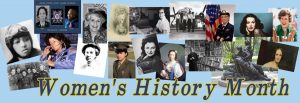Mar 25 2019, 11:39 am in Women in Time of War, Women's History Month

Let’s talk Women in Time of War.
There are so many, little known, brave women in our world history.
In 1716, Winifred Maxwell, Countess of Nithsdale, successfully smuggled her husband, Lord Nithsdale, out of the Tower of London, the day before he was due to be executed for his role in the 1715 Jacobite uprising . She supplied the guards with drink and then with friends created diversions while her hub’s beard was shaved and he was dressed in women’s clothes. Slick as anything William left with his wife’s friends. To buy time, Winifred stayed in the cell and carried on a conversation for the guards to hear. On her way out, she asked the guards not to disturb her husband because he was praying. Dang. The woman had courage.
In WWl a 17-year-old French woman, Emilienne Moreau, assisted the Allies and set up a first-aid post in her home.
Russian peasant Maria Bochkareva, twice wounded in battle, led the all-women combat unit the “Women’s Battalion of Death” on the eastern front. Look it up.
American journalist Madeleine Doty, determined to make a difference, traveled to Germany during the war to report the truth.
During WWll actress Hedy Lamarr developed a radio guidance system for Allied torpedoes which used spread spectrum and frequency hopping technology to defeat jamming by Axis powers. The principles are now incorporated in wi-fi and Bluetooth technology.
Julia Childs was a world-renowned chef. She was also a SPY. At the onset of World War II, she went to work for a newly formed government intelligence agency the Office of Strategic Services (OSS). She went on assignments around the world and played a key role in the communication of top-secret documents between U.S. government officials and their intelligence officers.
Nancy Augusta Wake. She ran away from her home in Australia at age 16. Worked as a nurse, traveled to New York and London. Married a wealthy Frenchman and became the single biggest thorn in the German’s side during WWll. The Gestapo called her the White Mouse because she eluded capture. She was their most wanted person and they put out a five million-franc reward for her capture. In a WWll movie if you see a woman depicted doing extraordinary things it is more than likely something Nancy actually did. She died in 2011 and I truly wish I had met her. There is simply too much to say about this amazing woman. I suggest you research her.
The women of London who, during the war, sent their children to the countryside in hopes they’d be safe then went about enduring the almost daily bombings of the city. Can you imagine?
Women Airforce Service Pilots, or WASPs. About 200 women flew planes during World War II but weren’t considered “real” military pilots. No flags were draped over their coffins when they died on duty. And when their service ended, they had to pay their own bus fare home.
An incredible group of Soviet women, most under 20 years of age, flew bombing missions during World War II. Many flying more than a thousand missions. The Germans feared them and gave them the name The Night Witches.
Rosie the Riveter, a name for American women who worked in factories during WWll, many in plants that produced munitions and war supplies. Rosie’s Canadian sister was just as determined and dedicated.
In 1945, Olivia Hooker became the first African-American female admitted into the United States Coast Guard. Dr. Hooker later earned a doctorate in psychology and had a long and distinguished career as a professor in New York, retiring at the age of eighty- seven. She is amazing.
Rose Valland a French art historian, and member of the French Resistance, a captain in the French military, and one of the most decorated women in French history. Rose is one of the greatest and yet unknown heroines of World War II. For four years, Rose risked her life daily to locate and return works of art stolen by the Nazis during their occupation of France. Her remarkable story remained unknown to the broad public until it was revealed in the book and movie The Monuments Men. I’ve stood in galleries admiring the art she saved and never knew about her until the book was released. It makes me sad the world didn’t know to thank her.
The contributions these ladies made are huge. Without them our world would be very different.
Rita


